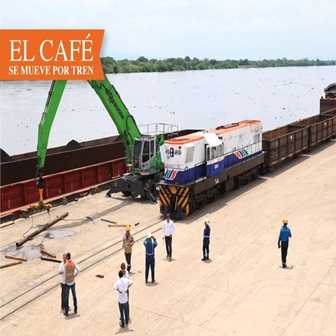BOGOTA, Colombia — In a joint work with the Colombian Coffee Growers Federation (FNC), over 4,000 bags of coffee were sent by train in November to Santa Marta, under a project that seeks to reduce costs of transportation of coffee and other export products of the country.
This first shipment of coffee to the port, which will revive the railway as a means of transport, is led by the Ministry of Transport, the National Infrastructure Agency (ANI), the Association of Coffee Exporters (Asoexport), Analdex, the FNC and the Santa Marta Port Society (SMITCO), and included other companies in the coffee sector such as Carcafé, Cooperativa de Andes, Engelhart, Expocafé, Louis Dreyfus, Olam, and Racafé.
“We are very pleased to participate in this project. It undoubtedly improves competitiveness of the coffee sector and other export products. In the case of coffee, we are talking about a reduction of 15 to 20% in transportation costs,” Roberto Vélez, the FNC CEO, said.
The institution expects consolidation of the scheme for coffee shipments from La Dorada and to do the same thing with other destinations, like using the railway from Santander to Santa Marta; the coffee sector is waiting for what will happen with transport along the Magdalena River.
The 4,000 bags of coffee from Antioquia, Quindío, Risaralda, Cundinamarca and Tolima will arrive in La Dorada, Caldas, where they will begin their 766 km journey by train to Santa Marta, where the coffee will be exported to the main markets in Europe and the U.S.
The national Government, which hopes to fine-tune logistics and commercial aspects to start a permanent coffee export operation by train starting in 2019, makes it clear that the railway, rather than a replacement, seeks to complement the operation of freight trucks and make it more efficient by implementing shorter and more frequent trips that contribute, in turn, to increasing quality of life of transporters and the population, by reducing the flow of heavy cargo in some areas of the country.
It also invited all production sectors to join this initiative to move export and import products using multimodal transport options.


















